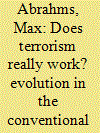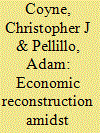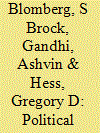| Srl | Item |
| 1 |
ID:
110006


|
|
|
|
|
| Publication |
2011.
|
| Summary/Abstract |
The basic narrative of bargaining theory predicts that, all else equal, anarchy favors concessions to challengers who demonstrate the will and ability to escalate against defenders. For this reason, post-9/11 political science research explained terrorism as rational strategic behavior for non-state challengers to induce government compliance given their constraints. Over the past decade, however, empirical research has consistently found that neither escalating to terrorism nor with terrorism helps non-state actors to achieve their demands. In fact, escalating to terrorism or with terrorism increases the odds that target countries will dig in their political heels, depriving the non-state challengers of their given preferences. These empirical findings across disciplines, methodologies, as well as salient global events raise important research questions, with implications for counterterrorism strategy.
|
|
|
|
|
|
|
|
|
|
|
|
|
|
|
|
| 2 |
ID:
110009


|
|
|
|
|
| Publication |
2011.
|
| Summary/Abstract |
Economic reconstruction typically takes place after the end of war. Yet recently, economic reconstruction has been viewed as a means to 'win hearts and minds' during ongoing conflict. Drawing on a variety of reconstruction experiences from Afghanistan and Iraq, we identify four 'reconstruction traps' that result from the incentives and constraints faced by actors involved in economic reconstruction during ongoing conflict. These traps include: 1. the credible commitment trap, 2. the knowledge trap, 3. the political economy trap, and 4. the bureaucracy trap. Avoiding these traps is critical for successful economic reconstruction; and we discuss potential strategies for doing so.
|
|
|
|
|
|
|
|
|
|
|
|
|
|
|
|
| 3 |
ID:
110007


|
|
|
|
|
| Publication |
2011.
|
| Summary/Abstract |
This article introduces integro-differential equations as a new technique to study terrorism dynamics. An integro-differential equation is a mathematical expression that contains derivatives of the required function and its integral transforms. The technique is applied to two different dynamic models in terrorism: terrorism and tourism, and terrorist innovations. In the first model the number of tourists that appears in an integral term and also in a derivative term is impacted by the number of terrorists. In the second model the integro-differential equation for terrorist innovations relates them to terrorist attacks. The article shows how to solve, analyze, interpret, and deal with integro-differential equations. Integro-differential equations shed light on aspects of the models ignored when other techniques are used. This is particularly important for the evaluation of current counterterrorist policies, as well as to the formulation of new ones.
|
|
|
|
|
|
|
|
|
|
|
|
|
|
|
|
| 4 |
ID:
110010


|
|
|
|
|
| Publication |
2011.
|
| Summary/Abstract |
A nonlinear optimization model is developed in this paper to identify the optimal replacement strategy for military aircraft. In the model, the aircraft operating and maintenance (O&M) costs per available year are estimated as a function of age during the aircraft life cycle. After determining the optimal replacement policy, the model is applied to the CF Long-Range Patrol CP-140A Arcturus fleet. A sensitivity analysis is also carried out to assess the impact of some key model parameters on the result.
|
|
|
|
|
|
|
|
|
|
|
|
|
|
|
|
| 5 |
ID:
110008


|
|
|
|
|
| Publication |
2011.
|
| Summary/Abstract |
This paper presents an empirical analysis of what drives congressional legislation on terrorism during the period 1995 to 2010. We utilize and augment current methodology to compile and analyze data on sponsorship and cosponsorship of terrorism related data. Our results on the sources of legislation on terrorism are largely in line with past examinations of the importance of committee membership and leadership, party majority-ship, and other political factors. Further, we find that the most significant and robust drive for legislation on terrorism is the September 11th attacks. And while the impact of 9/11 affected legislative productivity everywhere, we find that it most significantly affected states surrounding New York and Washington D.C. Our results indicate that the economy may be one factor motivating politicians to legislate on terrorism; however, these results are not robust.
|
|
|
|
|
|
|
|
|
|
|
|
|
|
|
|